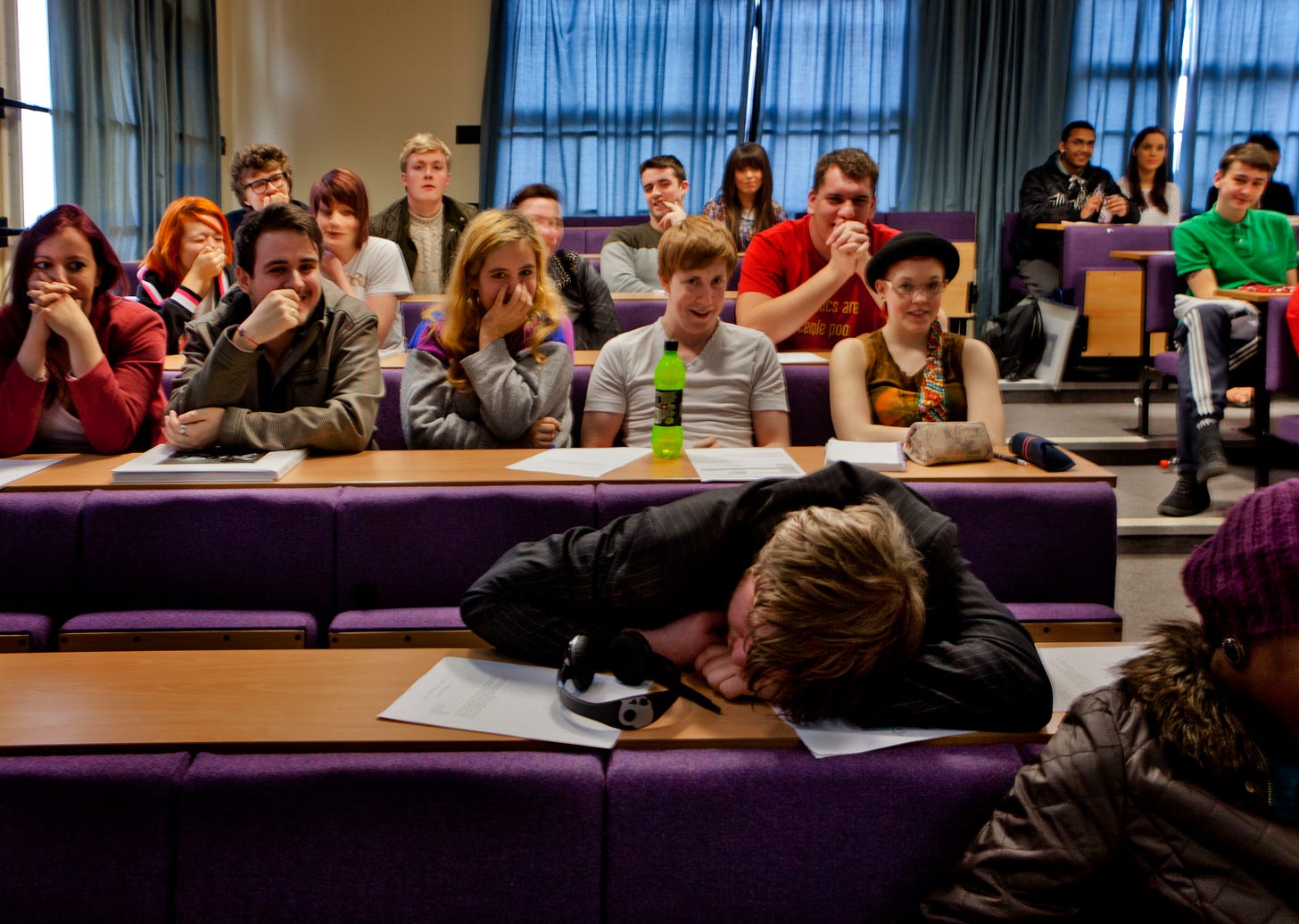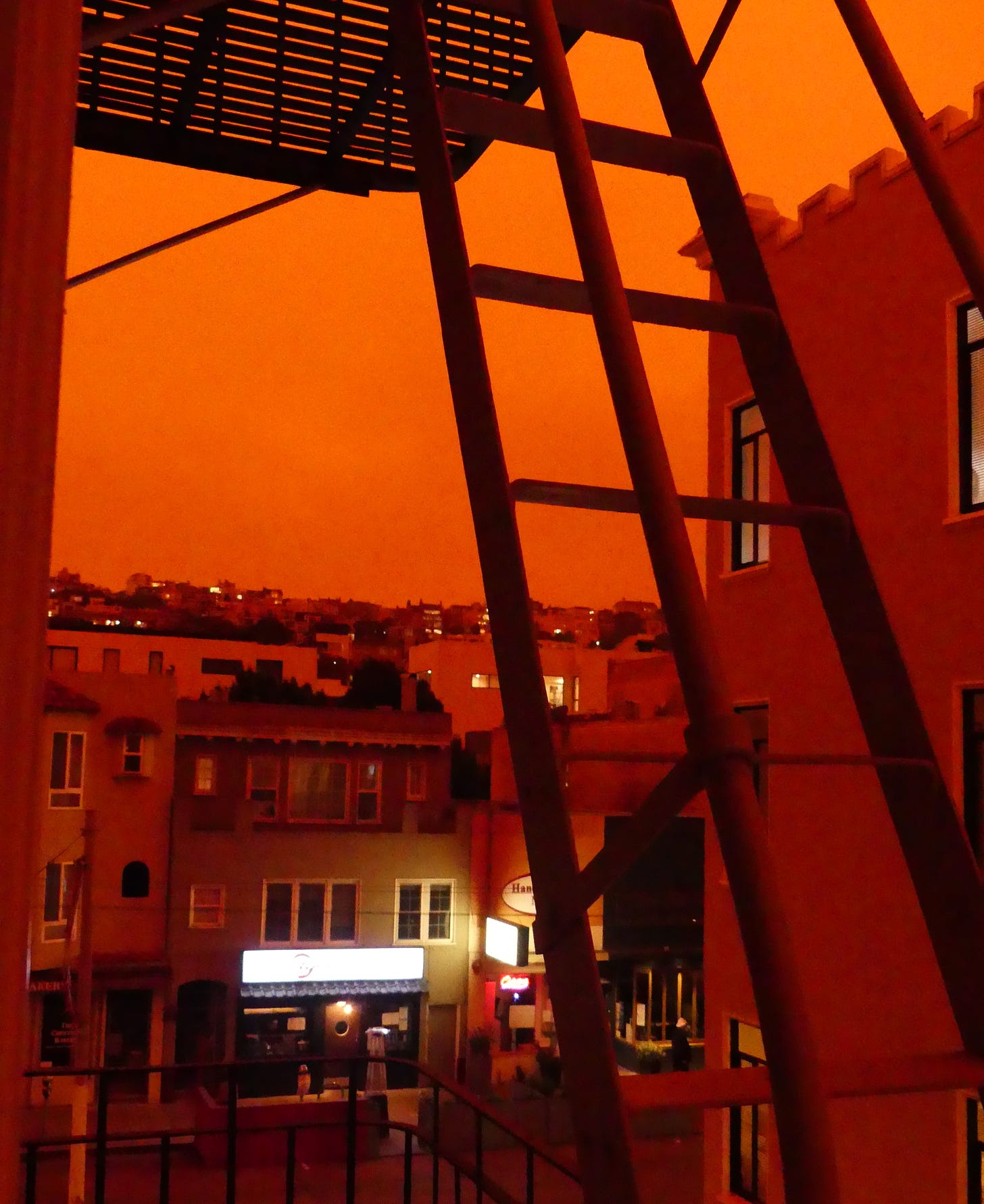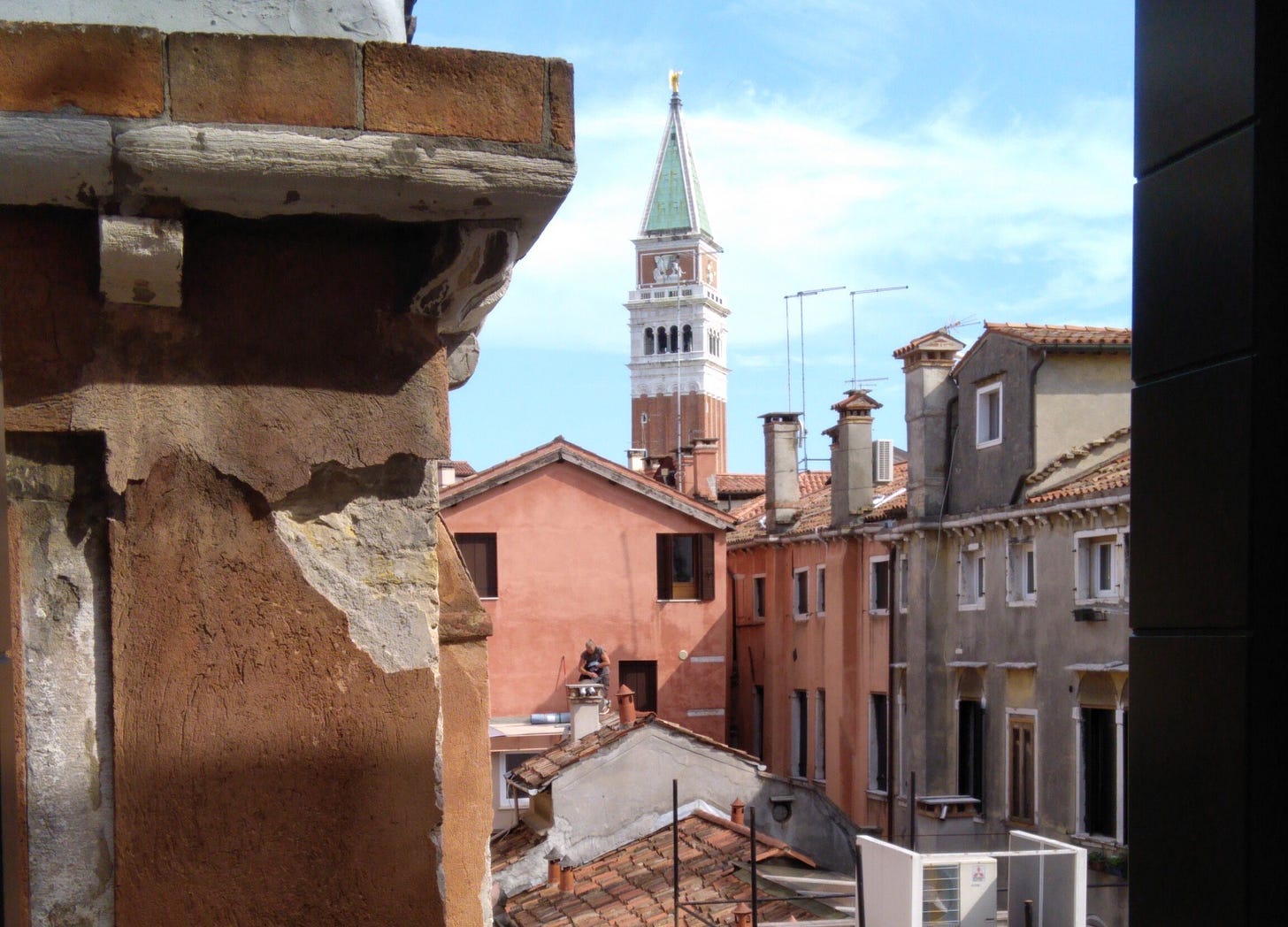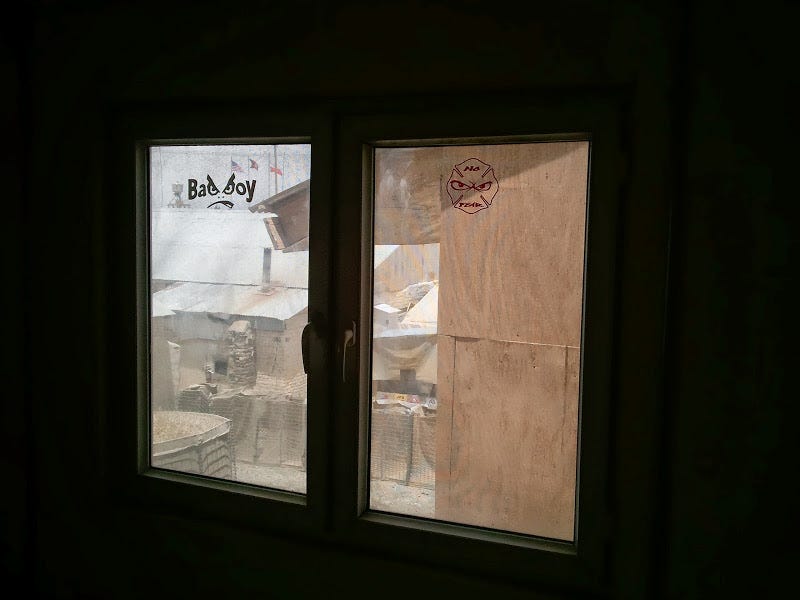The Logic Of Bell Curve Leftism
The Logic Of Bell Curve Leftism ——

A boy falls asleep during a lecture at De Montfort University in Leicester, UK. By In Pictures Ltd./Corbis via Getty Images.
There aren’t many books out there these days by revolutionary communists who are into the genetics of intelligence. But then there aren’t many writers like Freddie DeBoer. He’s an insistently quirky thinker who has managed to resist the snark, cynicism and moral preening of so many others in his generation — and write from his often-broken heart. And the core of his new book, “The Cult of Smart,” is a moral case for those with less natural intelligence than others — the ultimate losers in our democratic meritocracy, a system both the mainstream right and left have defended for decades now, and that, DeBoer argues, gives short shrift to far too many.
This isn’t a merely abstract question for him. He has grappled with it directly. As a school teacher he encountered the simple, unavoidable fact that some humans are more academically gifted than others, and there’s nothing much anyone can do about it. He recalls his effort to teach long division to a boy who had managed to come a long way socially (he’d gone from being a hell-raiser to a good student) but who still struggled with something as elemental as long division: “At one point he broke into tears, as he had several times before … I exhaled slowly and felt myself give up, though of course I would never tell him so. I tried to console him, once again, and he said, ‘I just can’t do it.’ And it struck me, with unusual force, that he was right.”
What DeBoer tries to do is explain how our current culture and political system is geared to torment, distress and punish this kid for no fault of his own. “This is the cult of smart,” DeBoer proclaims. “It is the notion that academic value is the only value, and intelligence the only true measure of human worth. It is pernicious, it is cruel, and it must change.” It has become un-American — or perhaps it always was? — to say that an individual has natural limits, that, even with extremely hard work, he won’t always be able to realize his dreams. And this is not because of anything he has done or failed to do — but simply because of his draw in the genetic lottery of life. The very American cult of education is supposed to end this injustice — except that it doesn’t, because it can’t, and its brutal logic actually exposes and entrenches the least defensible inequality of all, the inequality of nature.
This genetic reality — in fact, the very idea of nature existing at all — is currently a taboo topic on the left. In the most ludicrously untrue and yet suffocatingly omnipresent orthodoxy of our time, critical theory leftists insist that everything on earth is entirely socially constructed, that all inequality is a function of “oppressive systems”, and that human nature itself is what John Locke called a “white paper, void of all characters” — the famous blank slate. Freddie begs to differ: “Human behavioral traits, such as IQ, are profoundly shaped by genetic parentage, and this genetic influence plays a larger role in determining human outcomes than the family and home environment.”
People are not just born unequally and unfairly into class, and culture, and place, they are inherently unequal in various ways in their very nature: “not everyone has the same ability to do calculus; not everyone has the same grasp of grammar and mechanics … we can continue to beat our heads against the wall, trying to force an equality that just won’t come. Or we can face facts and start to grapple with a world where everyone simply can’t be made equal.” And this is not a counsel of despair. What Freddie is arguing is that, far from treating genetic inequality as a taboo, the left should actually lean into it to argue for a more radical re-ordering of society. They shouldn’t ignore genetics, or treat it as unmentionable, or go into paroxysms of fear and alarm over “eugenics” whenever the subject comes up. They should accept that inequality is natural, and construct a politics radical enough to counter it.
For DeBoer, that means ending meritocracy — for “what could be crueler than an actual meritocracy, a meritocracy fulfilled?” It means a revolutionary transformation in which there are no social or cultural rewards for higher intelligence, no higher after-tax income for the brainy, and in which education, with looser standards, is provided for everyone on demand — for the sake of nothing but itself. DeBoer believes the smart will do fine under any system, and don’t need to be incentivized — and their disproportionate gains in our increasingly knowledge-based economy can simply be redistributed to everyone else. In fact, the transformation in the economic rewards of intelligence — they keep increasing at an alarming rate as we leave physical labor behind — is not just not a problem, it is, in fact, what will make human happiness finally possible.
If early 20th Century Russia was insufficiently developed for communism, in other words, America today is ideal: “The communist revolution could take place in an economy more than capable of providing food, housing, education, and medical care for everyone … an economy, that is, like the twenty-first century one.” Let the super-smart create the wealth and then tax the hell out of them — to provide Medicare for all, universal pre-K, and a UBI or a guaranteed job.
This genetic case for communism can leave a reader a little disoriented, I have to say, if only for its novelty. But it is more coherent, it seems to me, than a leftism that assumes that genes are irrelevant to humans and society, that the ultimate goal is to be as smart and thereby wealthy as possible, and that we can set up an educational system where everyone, regardless of their genetic inheritance, can succeed or fail by their own efforts. What sounds like a meritocratic dream is, in practice, a brutal and unforgiving formula for most who can’t achieve it — and has obviously failed if its task is to foster equality. In fact, mass education appears to have increased the gulf between rich and poor. As Freddie notes, “education is not a weapon against inequality; it is an engine of inequality.”

I think it was Mickey Kaus who once quipped about the potential for “Bell Curve Leftism”, but DeBoer takes it seriously and thinks it through. Here’s the critical point: “In insisting on the power of genetics to shape our academic lives, and thus our economic lives, I am simply taking leftwing thought to its next logical conclusion … In most arenas, ascribing outcomes to biological factors is the more progressive position — when it comes to being overweight, for example, or in the case of mental illness, progressive people tend to believe that it’s biology, not willpower, that plays the largest role.”
So why not intelligence? Why do we imply it’s a matter of mere will? It’s not as if the genetic roots of intelligence aren’t well established; or the data proving the irrelevance of parenting and most education isn’t sound. So why the resistance? “It frequently seems as if progressives only believe in evolution from the neck down,” DeBoer notes. “And this sclerotic attitude is not just unnecessary. It is potentially crueler than the alternative.”
The reason for the left’s pathological distrust of the genetics of intelligence, of course, is about groups. Many legitimately worry that because there are real differences between some crudely defined racial groups, intelligence genetics must be inherently racist, and thereby should remain a forbidden topic. Freddie is risking cancellation by even mentioning it. But he insists that the heritability of intelligence is for individuals, not groups: “it is perfectly consistent to believe that the difference between individual students is largely genetic while the difference between racial groups is not.” And indeed it is.
So why is the difference between these “racial” groups so great and seemingly stable, even if there is more variability within any such group than between any? Freddie notes that “if the average white student sits at 50 percent of all students at a given academic task, the average black student lies somewhere between 15 and 30 percent,” which is not a minor difference. DeBoer doesn’t explain it as a factor of class — he notes the IQ racial gap persists even when removing socio-economic status from the equation. Nor does he ascribe it to differences in family structure — because parenting is not that important. He cites rather exposure to lead, greater disciplinary punishment for black kids, the higher likelihood of being arrested, the stress of living in a crime-dominated environment, the deep and deadening psychological toll of pervasive racism, and so on: “white supremacy touches on so many aspects of American life that it’s irresponsible to believe we have adequately controlled for it in our investigations of the racial achievement gap.”
He is emphatic on this, as well he might be, inveighing against pernicious “race scientists” whose genetic reductionism he says is indistinguishable from racism. But he is almost as withering about those “well-meaning but misguided people who dismiss the importance of genetics out of hand, who associate any discussion of the heritability of behavioral traits with the worst elements of eugenics and colonialism, and who make grandiose claims about a scientific literature they have never read.”
He has, in fact, read some of it, and notes that the genetic origins of intelligence are increasingly indisputable: “a major study utilizing a data set of thousands of test subjects revealed 52 varieties in genotype that were associated with differences in intelligence.” And he wants to end the left’s taboo: “through grappling with the data, we can craft better arguments against those who would misuse it to advance their racist and sexist agendas. Or we can ignore the data, dismiss the subject entirely, cede the field to the worst people imaginable and suffer the consequences.”
If this book does nothing but prompt some liberals and lefties to relax and rethink on this subject, it will be worth it. I suspect the left’s insecurity about genetics is partly why so many have fallen completely for the critical theory cult, leaving reality far behind, and sustaining this new (and false) consensus at this point solely by punishment of dissent. But Freddie is not easily dismissed. And his broader argument about the moral neutrality of intelligence largely makes the fear of fomenting racism somewhat moot. If there should be no stigma toward the less intelligent, why would it matter if differences in intelligence between “racial” groups persisted? We would simply recognize the gaps, focus resources on those less gifted, deconstruct the cult of smart, and aim to increase the flourishing of every community and individuals. If we drop the inferior/superior framework and simply accept natural differences between individuals and even between groups, we could better help everyone.
And this is, surely, a moral project as much as a political one. To see intelligence as having some kind of special moral salience, to see it as the ultimate virtue or credential, is bizarre. Yes, we can admire the astonishing ability of, say, a master chess player, or a gifted coder. But we need not see them as somehow better human beings. You can acknowledge the central role of intelligence in helping some achieve their goals, without valorizing it as the ultimate compliment.
One thing we have learned in this epidemic, for example, is the vital importance of essential workers, the nurses and carers, the trash-collectors and food-preparers, the supermarket cashiers and truck drivers. They are people we should look up to, not down on, as they keep our entire society functioning. Instead, I suspect that many smart people have mistaken their own unearned gift for some kind of moral virtue, which is why they are so reluctant to note that others may not be so smart, and if they do so, think less of them. Remove the elites’ vanity, and self-love, and you can see their irrationality for what it is.
For me, intelligence is a curse as well as a blessing — and it has as much salience to my own sense of moral worth as my blood-type. In many ways, I revere those with less of it, whose different skills — practical, human, imaginative — make the world every day a tangibly better place for others, where mine do not. Being smart doesn’t make you happy; it can inhibit your sociability; it can cut you off from others; it can generate a lifetime of insecurity; it is correlated with mood disorders and anxiety. And yet the system we live in was almost designed for someone like me. No one in my family had been to college before me; and at the age of 10, I was given a simple IQ test to see whether I would qualify for a place in a selective school — and my life was changed for ever.
At the same time, my grandmother was living with us. The seventh of thirteen kids, she had close to no education, trafficked in stories of ghosts and fairytales from her Irish rural childhood, never seemed to read anything, feigned horror at every event in the news, and could recite the Hail Mary at the volume and speed of a Sotheby’s auctioneer. Her skills had been cleaning houses (if rarely her own). And she lived with a blithe serenity, an almost careless grace, and a steadying faith that I came to see as beyond my own reach. My big brain, I realized, was as much an impediment to living well as it was an advantage. It was a bane and a blessing. It simply never occurred to me that higher intelligence was in any way connected to moral worth or happiness.
In fact, I saw the opposite. I still do. I don’t believe that a communist revolution will bring forward the day when someone like my grandmother could be valued in society and rewarded as deeply as she should have been. But I believe a moral revolution in this materialist, competitive, emptying rat-race of smarts is long overdue. It could come from the left or the right. Or it could come from a spiritual and religious revival. Either way, Freddie DeBoer and this little book are part of the solution to the unfairness and cruelty of it all. If, of course, there is one.

San Francisco, California, 10.20 am
Dissents Of The Week
A reader tackles the foreign policy side of my last anti-Trump column:
You say that Trump is “more likely to be in alliance with the dictators” … as if anti-China rhetoric and sanctions aren’t a major part of his campaign strategy. He trash-talks China on a regular basis! You also seem to think that the US can somehow control the behavior of those governments, when we cannot. Putin defied the US in Ukraine and many other places before Trump was elected, and he will continue to do so regardless of the next president. The only thing the US can do is sanction Russia — which is already happening; Trump has increased sanctions across the board.
I can see the limits of controlling the behavior of Putin and Xi. But actually defending Putin’s murderousness as no worse than America’s, and actually encouraging Xi to put Muslims in concentration camps, seems to me to be in another category. Another reader writes:
It is true that Trump’s understanding of the limitations of his office are often embarrassing and frightening, but he cannot alter those limitations in any fundamental way, and any overreach he attempts will be shot down, as the Muslim ban was. His overreach seems not so much the attitude of a would-be dictator as that of a business owner used to getting his way.
And yet has has successfully stalled any real accountability to Congress, by legal maneuvers. Another reader jumps on me for calling Biden “too old”:
Why let Trump and RNC own the age issue? Trump, at 74, is only three years younger than Biden — a differential which, in one’s seventies, or later, is meaningless absent provable medical or cognitive deficiencies.
They’re both too old for a job of that strenuousness. But Biden somehow seems older, which worries me. Another reader illustrates what some swing voters may be thinking:
Liberal voters have been in charge of the Minneapolis, Portland, and Chicago police departments for decades. They own every single hire. But the violence is Trump’s fault?
I hate Trump’s buffoonery. I hate his frat-boy style of humor and insults. But Biden voters burned down the community where I grew up in Minneapolis. They looted and burned down the Target where I had my first job at 16. They came within blocks of burning my brother in-law’s home in Kenosha. That’s just the tip of the iceberg if Biden is elected. He’s going to capitulate to each and every far-left demand and it will never be enough.
“Biden-voters” seems like guilt by association to me. Please. Many of the rioters won’t vote at all, I suspect. Another reader:
The metastasizing cancer isn’t Trump; it’s the extreme left, and it’s been growing for the past 50 years. It’s spread through our colleges, where it indoctrinated a generation that invaded countless institutions — from old media companies to new ones, from the New York Times to Twitter, to bureaucracies at every level of government, to high schools and elementary schools where the brainwashing now begins earlier than ever.
You’re missing the cause for the effect. Illiberalism is not a symptom of Trump. It was an illness that was already with us. The traditional left, what little remains, is allowing illiberalism to run rampant in a selfish bid to regain political power. In the process they’re unleashing a monster that will ultimately eat them, and when they finally realize they can’t control it, it will be too late.
The clear and decisive defeat we need this fall is not of the GOP, but of any party that would dare to court this extremism. Fires like this can’t be allowed to breathe. Joe Biden, or what’s left of him, won’t be strong enough to put it out.
We can survive four more years of Trump — he’s too stupid and ineffective to make any permanent changes. We won’t survive the alternative. The Democrats need to use the next four years to straighten their own house and expel the extremists that have nearly taken over their party.
I truly don’t know what will be left of the republic and the world if Trump is re-elected. And my reader’s point might have been stronger if the Democrats had selected anyone but Biden — the most centrist and least radical candidate available.

Venice, Italy, 4.20 pm
Yglesias Award Nominee
“On the ground [in NYC] is certainly feeling more violent, feeling more unsafe, in unsafe communities, if you know what I mean. … [Defunding the cops] is something a Latte Liberal may go for as they sit around the Hamptons discussing this as an academic problem. But people living on the ground need proper policing,” - Al Sharpton.
In The ‘Stacks
From other independent writers on Substack this week:
-
A recent event featuring Adolph Reed Jr. — a leftist scholar and black man — was canceled at the last minute by the Democratic Socialists of America because Reed is critical of critical race theory. Go here to read about Reed’s cancelable ideas and those of his son, the historian Touré F. Reed.
-
Luke O'Neil at “Welcome to Hell World” rounds up recent horror stories of predatory student loans and addresses the plight of journalist Sarah Kelly.
-
Bob Wright’s “Nonzero Newsletter” is a must-read — this month, he provides a guide that you should use to help decrease tribalism on Twitter.
Face Of The Week

A cat sits across the street from the smoldering remains of Cressman’s General Store and Gas Station (est. 1904) along CA-168, which the Creek Fire tore through and jumped on Sept. 8, 2020 in Fresno County, CA. By Kent Nishimura / Los Angeles Times via Getty Images.
Quote For The Day
“A San Francisco husband slept through his wife’s call from the World Trade Centre. The tower was burning around her, and she was speaking on her mobile phone. She left her last message to him on the answering machine. A TV station played it to us, while it showed the husband standing there listening. Somehow, he was able to bear hearing it again.
We heard her tell him through her sobbing that there was no escape for her. The building was on fire and there was no way down the stairs. She was calling to say goodbye. There was really only one thing for her to say, those three words that all the terrible art, the worst pop songs and movies, the most seductive lies, can somehow never cheapen. I love you.
She said it over and again before the line went dead. And that is what they were all saying down their phones, from the hijacked planes and the burning towers. There is only love, and then oblivion. Love was all they had to set against the hatred of their murderers,” - Ian McEwan, reporting on the September 11 attacks. (Hat tip: the invaluable John Ellis, now on Substack)
From The Annals Of Dishness

A reader emailed this window view on January 30, 2015, just as the Daily Dish was retiring, so we didn’t get a chance to post it. He wrote at the time:
This photo was taken on June 3, 2013, from Building 108 (“the Tin Can”), Forward Operating Base (FOB) Rushmore, Sharana District, Paktika Province, Afghanistan. For security reasons, I have delayed submission. I’ve been in the Foreign Service more than half my life and have followed your blog since the beginning. It has given my life, especially while deployed, much meaning. I served in the field in Afghanistan for over a year, and I was embedded with our military in Iraq. On Election Day 2008, you published one of my emails as “The View from Your Election: Baghdad.”
In that post, the reader, who supported Obama, described helping a colleague fill out an absentee ballot despite him being a strong backer of McCain-Palin. I added, “If that doesn’t reflect the spirit of Obama’s campaign, what does?” This election, the reader is back in the spirit of things:
For Election Day 2020, I am volunteering to serve as a Poll Worker in my community in Florida, as a civic duty. May I respectfully suggest that you urge your readers to do the same? Since fewer older Americans will be volunteering at the polls this fall, out of health concerns over Covid, younger Americans need to step up. Part of the solution? Now is the time.
Mental Health Break
ICYMI
Things I did elsewhere last month:
-
For my new monthly diary with the British Spectator, I wrote about my run-in with the NYT’s media columnist and my adolescent ties to UK party leaders Boris and Keir.
-
I appeared on the Faith Angle podcast with my old sparring partner in the blogosphere, Rod Dreher, who just came out with a new book, Live Not by Lies: A Manual for Christian Dissidents.
-
I joined Kmele and Moynihan on their 200th episode of The Fifth Column, one of the best podcasts out there. Forgive the anecdote about my balls and the tidal pools. More TMI to come with the Dishpod this fall.
The View From Your Window Contest

So, where do you think it’s located? Email your entry to contest@andrewsullivan.com. Please put the location — city and/or state first, then country — in the subject heading, along with any details about the location within the body of the email. The winner gets the choice of a VFYW book or two gift subscriptions. Happy sleuthing! (The results for the previous contest are being emailed to subscribers shortly.)
And as always, keep the dissents coming, along with anything else you might want to add to the conversation: dish@andrewsullivan.com. But please try to be concise: the new format of The Weekly Dish is much more constrained than The Daily Dish, so it’s more difficult to include your smart commentary when it stretches into many paragraphs.
See you next Friday.
文章版权归原作者所有。
